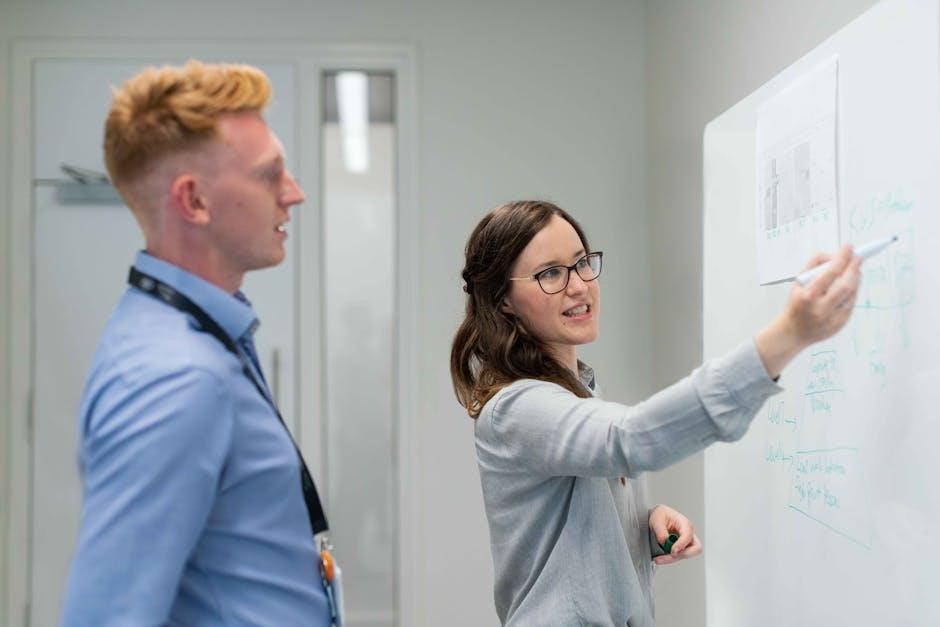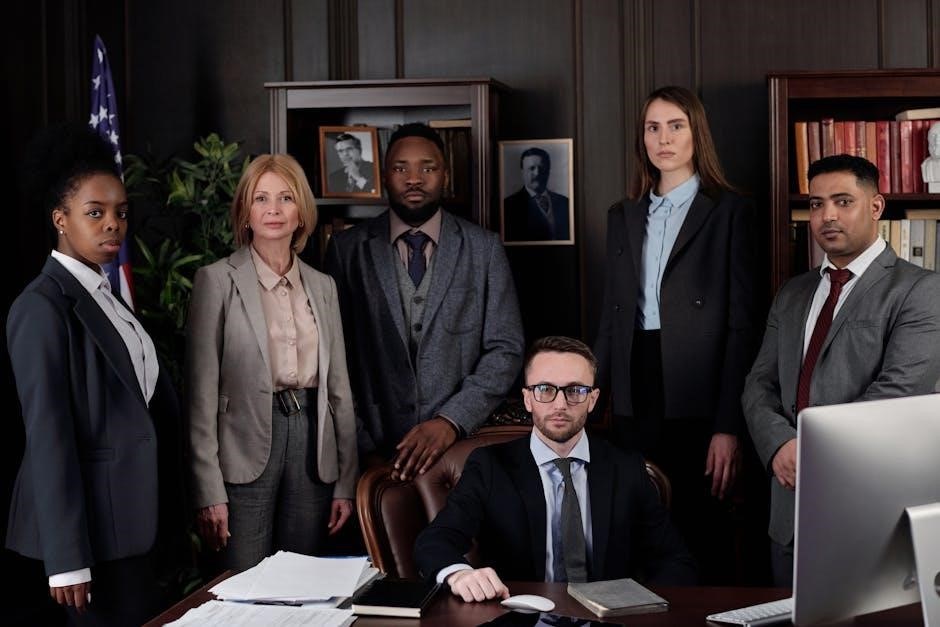
massachusetts open meeting law guide
This guide provides comprehensive insights into the Massachusetts Open Meeting Law, ensuring transparency in government deliberations. It outlines requirements for posting meetings, remote participation, executive sessions, and compliance procedures to promote public access and accountability.
Welcome to the Massachusetts Open Meeting Law Guide. This guide outlines the importance of transparency in government meetings and ensures public access to decision-making processes.
Overview of the Massachusetts Open Meeting Law
The Massachusetts Open Meeting Law ensures transparency in government by requiring public bodies to conduct meetings openly. It mandates posting notices, agendas, and minutes, ensuring public access. The law applies to most governmental entities, including subcommittees. Key aspects include remote participation rules, executive session guidelines, and compliance measures. Recent updates, such as the 2025 extensions, reflect ongoing efforts to adapt to modern needs while maintaining accountability. This law is crucial for fostering trust and accountability in governmental decision-making processes, ensuring the public remains informed and engaged in policy deliberations.
Importance of Transparency in Government Meetings
Importance of Transparency in Government Meetings
Transparency in government meetings is fundamental for building public trust and accountability. It ensures that decision-making processes are open, accessible, and understandable to all citizens. By requiring public access to meetings and materials, the Open Meeting Law promotes accountability and prevents potential abuses of power. Transparency fosters a more informed and engaged citizenry, which is essential for a functioning democracy. Without it, there is a risk of corruption and mistrust. Compliance with the law ensures that public bodies operate with integrity, upholding the principles of open and ethical governance.

Purpose and Scope of the Open Meeting Law
The Purpose and Scope of the Open Meeting Law ensures transparency in government decision-making by requiring public access to meetings and materials, promoting accountability and integrity.
What is the Open Meeting Law?
The Massachusetts Open Meeting Law (OML) mandates that most meetings of public bodies be conducted openly. Enacted to ensure transparency, it requires advance notice, public access, and adherence to specific procedures. The law applies to governmental entities, including boards, commissions, and subcommittees. Key aspects include posting requirements, remote participation rules, and restrictions on executive sessions. Compliance is enforced by the Attorney General, with penalties for violations. The OML aims to foster trust by enabling public scrutiny of governmental decision-making processes. It is a cornerstone of democratic governance in Massachusetts.
Why is the Open Meeting Law Important?
The Open Meeting Law is crucial for ensuring transparency, accountability, and public trust in government operations. It mandates open access to meetings, enabling citizens to witness decision-making processes, fostering accountability and preventing potential corruption. By requiring advance notice and public access, it empowers individuals to engage with officials, ensuring that governance remains fair and inclusive; Compliance with the law promotes trust and accountability, essential for a functioning democracy, while violations face penalties, further enforcing adherence to these principles.
Scope of the Law: Which Public Bodies Are Subject to OML?
The Open Meeting Law applies to all public bodies in Massachusetts, including committees, subcommittees, and boards. Any group of two or more members discussing public business is subject to the law. This ensures transparency across all levels of government, from town councils to state agencies. Even informal gatherings, if discussing public matters, must comply. The law’s broad scope ensures accountability and public access, preventing decisions from being made in secret. This inclusive approach reinforces the principle of open governance for all public entities.
Posting Requirements for Public Meetings
Public bodies must post meeting notices at least 48 hours in advance. This ensures transparency and allows public access, promoting accountability in government proceedings.
What Must Be Posted?
Meeting notices must include the date, time, location, and list of topics to be discussed. Notices should be posted in a public area and on the entity’s website. Ensure compliance with accessibility standards. This requirement promotes transparency, allowing the public to stay informed and participate in governmental decision-making processes. Proper posting is essential for accountability and ensures that all meetings are conducted openly, aligning with the principles of the Open Meeting Law. Failure to comply may result in legal consequences, emphasizing the importance of accurate and timely postings. Public access to this information is a cornerstone of democratic governance.
When Must Meetings Be Posted?
Meeting notices must be posted at least 48 hours in advance, excluding weekends and holidays. Emergency meetings may be posted within a shorter timeframe but must still comply with public access requirements. Notices should be filed with the appropriate clerk and displayed in a public area, as well as on the entity’s website. Timely posting ensures transparency and allows the public to plan attendance. Recent updates extend temporary provisions for remote meetings until June 30, 2027, but posting deadlines remain unchanged. Compliance with these timelines is crucial for maintaining accountability and public trust in governmental processes.
Where Must Meeting Notices Be Posted?
Meeting notices must be filed with the Town Clerk and conspicuously posted in a public area accessible to all. This typically includes bulletin boards near town halls or municipal buildings. Additionally, notices should be published on the public body’s official website, if available. Ensuring visibility and accessibility is crucial for compliance. Notices must also be posted in locations where the public is likely to see them, such as libraries or community centers. Digital posting is increasingly required to enhance transparency and reach a broader audience, aligning with modern accessibility standards and public expectations for open governance.
Content Requirements for Meeting Notices
Meeting notices must include the date, time, and place of the meeting, as well as a list of topics to be discussed. The notice must be posted at least 48 hours in advance, excluding weekends and holidays. It must also specify whether the meeting will be in-person, remote, or hybrid. If remote participation is allowed, the notice should provide details for accessing the meeting. The notice must be filed with the Town Clerk and made available to the public. Clear and accurate information ensures compliance with transparency requirements and informs the public effectively.

Remote Participation in Public Meetings
Remote participation in public meetings is permitted under specific conditions, such as emergencies or convenience, ensuring accessibility while maintaining transparency and compliance with legal requirements.
Rules for Remote Participation
Remote participation is allowed under the Open Meeting Law, enabling members to join meetings electronically. All participants must be audible to each other and the public. A quorum must still be physically present, ensuring transparency and accountability. Public access to the meeting must be maintained, with clear audio and visual components. Emergency situations may permit temporary remote sessions, but normal procedures should resume as soon as possible to uphold the integrity of public meetings and ensure compliance with legal standards;
Technological Requirements for Remote Meetings
Remote meetings under the Open Meeting Law require reliable technology ensuring clear audio and video for all participants and the public. The platform must allow real-time observation by the public without requiring registration or downloads. Closed captions or other accessibility features should be provided for individuals with disabilities. Security measures must prevent unauthorized access while maintaining public transparency. The technology should also support necessary features like screen sharing or document presentation to facilitate effective communication and decision-making, ensuring compliance with the law and promoting inclusivity in governance processes.
Limitations on Remote Participation
While remote participation enhances accessibility, it is subject to specific limitations under the Open Meeting Law. Public bodies must ensure that remote meetings are accessible to all members of the public without requiring registration or downloads. Technical issues must be addressed promptly to maintain continuity. Executive sessions may only be conducted in-person to preserve confidentiality and prevent unauthorized access. Additionally, remote participation must not compromise the integrity of deliberations or decision-making processes, ensuring transparency and compliance with the law’s requirements for open governance.

Executive Sessions Under the Open Meeting Law
Executive sessions are restricted to specific purposes, such as litigation, personnel matters, or real estate negotiations. A two-thirds majority vote is required, and sessions must be announced publicly beforehand.
When Can a Public Body Hold an Executive Session?
A public body may hold an executive session only for specific purposes, such as discussing litigation, real estate transactions, or personnel matters. A two-thirds majority vote is required to enter an executive session, and the session must be announced publicly beforehand. Minutes of executive sessions are required but may remain confidential under certain conditions. The law strictly limits the reasons for convening executive sessions to ensure transparency while protecting sensitive discussions.
Procedures for Entering an Executive Session
To enter an executive session, a public body must first announce the purpose publicly and obtain a two-thirds majority vote. The session’s purpose must align with one of the legally permitted reasons, such as discussing litigation or personnel issues. The announcement must include the specific reason and the vote count. Once in session, discussions must remain confined to the stated purpose. Minutes of executive sessions are required but may be sealed under certain conditions. Compliance with these procedures ensures accountability while safeguarding sensitive discussions.
What is Prohibited in Executive Sessions?
Executive sessions under the Massachusetts Open Meeting Law are strictly limited to specified purposes. Prohibited actions include discussing matters outside the announced purpose, making decisions, or taking votes. Deliberations on collective bargaining, budget preparations, or general policy matters are not permitted in executive sessions. Additionally, discussions unrelated to the legally allowed reasons, such as litigation or personnel issues, are prohibited. Ensuring adherence to these restrictions maintains transparency and accountability, preventing misuse of executive sessions for non-compliant purposes.

Meeting Notices and Agendas
Meeting notices and agendas must be prepared and distributed in advance, ensuring clarity on topics to be discussed. This promotes transparency and informed public participation.
How to Create a Valid Meeting Notice
To create a valid meeting notice under the Massachusetts Open Meeting Law, include the meeting date, time, location, and a detailed agenda of topics. Ensure the notice is posted at least 48 hours in advance in a public location and on the town’s website. Clearly state the name of the public body and provide contact information for inquiries. The notice must be legible, accessible, and free from unnecessary jargon to ensure transparency and public understanding.
What Should Be Included in a Meeting Agenda?
A meeting agenda must clearly list all topics to be discussed, ensuring transparency and public awareness. Include the date, time, and location of the meeting, as well as any proposed actions or decisions. Distinguish between old and new business, and allocate time for public comments if required. Provide sufficient detail for each agenda item to inform attendees of the meeting’s purpose. Ensure the agenda is concise, well-organized, and free from ambiguous language to facilitate public understanding and participation.
How to Distribute Meeting Notices
Meeting notices must be distributed in accordance with the Massachusetts Open Meeting Law to ensure transparency. Post the notice in a public place, such as a town hall or community board, at least 48 hours before the meeting. Additionally, post the notice on the public body’s official website. Include the date, time, location, and agenda topics. For remote meetings, provide access details like Zoom links. Emergency meetings may have shorter posting requirements. Ensure all notices are clear, timely, and accessible to the public to promote accountability and participation.

Conduct of Meetings
The law ensures meetings are conducted transparently, requiring a quorum, accurate minute-taking, and public access to materials. These practices promote accountability and informed decision-making.
Quorum Requirements for Public Meetings
A quorum is required for public bodies to conduct official business, ensuring a majority of members are present. This requirement guarantees deliberations are representative and decisions are legitimate. Failure to meet quorum results in the inability to take official action, protecting against unrepresentative decision-making. The law mandates strict adherence to quorum rules, maintaining transparency and accountability in governance. Public bodies must clearly define quorum thresholds, typically a simple majority, to ensure meetings are conducted fairly and openly.
Rules for Minute-Taking During Meetings
Accurate and detailed minutes are essential under the Open Meeting Law. Minutes must include the date, time, place of the meeting, a list of members present, and a record of all votes taken. Key discussions and decisions must be summarized, ensuring transparency. Minutes should be available for public review within a reasonable timeframe, typically within 10 business days. Audio or video recordings may supplement written minutes but are not substitutes. This ensures accountability and provides the public with a clear understanding of governmental actions and deliberations.
Public Access to Meeting Materials
Public bodies must ensure that meeting materials, including agendas, minutes, and supporting documents, are readily accessible to the public. These materials should be available upon request, fostering transparency and accountability. Agendas must outline all topics to be discussed, while minutes should capture key discussions and decisions. This ensures the public can stay informed and engage meaningfully with governmental processes. Compliance with these requirements is crucial to uphold the principles of open governance and maintain trust in public institutions.

Subcommittees and the Open Meeting Law
Subcommittees with two or more members are considered public bodies under the Open Meeting Law, requiring transparency and compliance with posting and meeting requirements.
Are Subcommittees Subject to OML?
Subcommittees consisting of two or more members are considered public bodies under the Open Meeting Law. They must adhere to all transparency requirements, including posting notices and conducting meetings openly. Subcommittees are not exempt from OML provisions, ensuring accountability and public access. Failure to comply can result in legal consequences, emphasizing the importance of understanding and following the law. This ensures that all governmental deliberations remain transparent and accessible to the public.
Special Requirements for Subcommittees
Subcommittees must comply with specific provisions under the Open Meeting Law, such as filing meeting notices with the town clerk and publicly posting them at least 48 hours in advance. They are also required to maintain detailed minutes and ensure public access to meeting materials. Additionally, subcommittees must hold meetings in accessible locations and allow public participation. These requirements ensure transparency and accountability, aligning with the broader goals of the Open Meeting Law to promote open governance and public trust. Compliance is essential to avoid violations and legal repercussions.

Enforcement and Compliance
The Attorney General oversees enforcement, ensuring compliance with transparency standards. Public bodies must adhere to meeting laws, promoting accountability and trust in government operations through strict guidelines.
How to Report Violations of the Open Meeting Law
To report violations, contact the Massachusetts Attorney General’s Division of Open Government. Submit complaints via email or phone (617-963-2540). Include details about the meeting, date, and nature of the violation. The Division investigates and addresses non-compliance, ensuring transparency and accountability in public proceedings. Public access to this process underscores the commitment to maintaining open and fair government operations across the state.
Role of the Attorney General in Enforcing OML
The Attorney General plays a crucial role in enforcing the Open Meeting Law (OML) by providing guidance and oversight. The Division of Open Government, established by the Attorney General, educates public bodies on compliance and investigates violations. They offer training and resources to ensure transparency and accountability in government meetings. By addressing complaints and interpreting the law, the Attorney General ensures that public bodies adhere to OML, fostering trust and openness in governance.
Penalties for Non-Compliance
Non-compliance with the Open Meeting Law can result in fines and legal consequences. Public bodies may face penalties up to $1,000 for violations. Additionally, individuals who intentionally violate the law may be personally liable. Courts can invalidate decisions made in non-compliant meetings, requiring redoing the process. The Attorney General may also mandate training for officials found in violation. Repeated or egregious offenses can lead to further legal action, emphasizing the importance of strict adherence to OML requirements to maintain transparency and public trust in governmental proceedings.

Recent Updates to the Open Meeting Law
The Open Meeting Law has been updated to extend temporary provisions until June 30, 2027, ensuring continued flexibility for public bodies while maintaining transparency requirements.
2025 Updates: What You Need to Know
The 2025 updates to the Massachusetts Open Meeting Law extend temporary provisions until June 30, 2027, allowing public bodies to continue using flexible meeting formats. These updates ensure compliance with transparency requirements while adapting to modern communication needs. The law now includes clearer guidelines for remote participation and executive sessions, emphasizing the importance of maintaining public access. Additionally, the updates reinforce penalties for non-compliance and provide more detailed procedures for reporting violations. These changes aim to enhance accountability and streamline processes for public bodies, ensuring the law remains effective in promoting open government.
Temporary Provisions and Their Extensions
Temporary provisions under the Massachusetts Open Meeting Law were extended to June 30, 2027, ensuring continued flexibility for public bodies. These provisions allow meetings to be held remotely and notice requirements to remain adaptable. The extensions aim to maintain transparency while accommodating evolving needs. Public bodies must still post meeting notices and agendas, and ensure public access to materials. These extensions provide stability and clarity, enabling effective governance while aligning with the law’s intent to promote openness and accountability in decision-making processes.

Best Practices for Compliance
Adopt regular training for public officials and review meeting practices to ensure transparency and adherence to the Open Meeting Law, fostering accountability and public trust effectively.
Training for Public Officials
Regular training for public officials is essential to ensure compliance with the Open Meeting Law. These sessions should cover key topics such as posting requirements, remote participation rules, and executive session protocols. Officials should understand their roles and responsibilities in maintaining transparency. Practical workshops and resources from the Attorney General’s office can provide hands-on guidance. Continuous education helps avoid violations and fosters a culture of accountability, ensuring public trust in governmental processes. Training also clarifies nuances, such as subcommittee obligations and minute-taking standards, to promote consistent and lawful meeting practices across all public bodies.
Regular Review of Meeting Practices
Regular review of meeting practices ensures ongoing compliance with the Open Meeting Law. Public bodies should periodically assess their procedures for posting notices, creating agendas, and conducting meetings. This review helps identify and correct potential violations, such as incomplete minutes or improper executive session usage. By evaluating meeting practices, officials can improve transparency and accountability. Regular audits also foster a culture of compliance, ensuring that all requirements are met consistently. This proactive approach helps maintain public trust and demonstrates a commitment to open and accessible government operations.
The Massachusetts Open Meeting Law ensures transparency and accountability in governance. Key aspects include proper meeting postings, executive session protocols, and remote participation guidelines. Compliance by public officials upholds trust and accountability.
The Massachusetts Open Meeting Law mandates transparency in governmental deliberations, ensuring public access to meeting materials and clear posting requirements. Remote participation is permissible under specific rules, while executive sessions are limited to defined purposes. Compliance involves adhering to quorum standards, accurate minute-taking, and strict adherence to posting deadlines. Public bodies must avoid private discussions outside authorized sessions. Penalties for non-compliance underscore the importance of understanding and following the law. The Attorney General’s office plays a critical role in enforcement, providing guidance to ensure accountability and uphold public trust in governance.
Final Thoughts on Compliance and Transparency
Compliance with the Massachusetts Open Meeting Law is essential for maintaining public trust and ensuring accountability in governance. By adhering to posting requirements, facilitating remote participation, and conducting meetings openly, public bodies demonstrate their commitment to transparency. Understanding the law’s nuances, such as executive session limitations and the importance of accurate documentation, is crucial for avoiding penalties. Ongoing training and regular reviews of meeting practices further enhance compliance. Ultimately, transparency fosters a well-informed citizenry and strengthens democratic processes, making it a cornerstone of effective governance under the Open Meeting Law.




